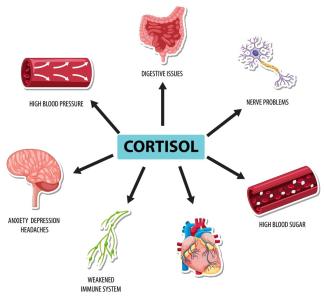
Excessive and neurotic cortisol secretion can have profound effects on the body and mind, as cortisol is a key stress hormone produced by the adrenal glands. In small, controlled amounts, cortisol is essential for various physiological and psychological functions. However, when its levels become chronically elevated due to excessive stress or neurotic patterns, it can lead to a range of detrimental effects on health and well-being.
- Immune System Suppression: High and prolonged cortisol levels can weaken the immune system. It suppresses the production of certain immune cells, making the body more susceptible to infections and illnesses.
- Metabolic Changes: Elevated cortisol can impact metabolism in several ways, potentially leading to:
- Increased Appetite: Cortisol can increase appetite, leading to overeating, which may contribute to weight gain and obesity.
- Abdominal Fat Accumulation: Cortisol has a tendency to promote fat storage, particularly in the abdominal area, which is associated with an increased risk of metabolic disorders like insulin resistance and type 2 diabetes.
- Cardiovascular Effects: Chronic cortisol elevation can increase the risk of cardiovascular problems, including:
- High Blood Pressure: Cortisol can lead to elevated blood pressure, increasing the risk of hypertension.
- Atherosclerosis: High cortisol levels can contribute to the development of atherosclerosis, the narrowing of arteries due to plaque buildup.
- Cognitive and Emotional Impact: Neurotic cortisol patterns, which often accompany chronic stress or anxiety, can affect mental health:
- Memory and Cognitive Impairment: Elevated cortisol levels can impair memory, concentration, and cognitive function.
- Mood Disorders: Chronic stress and excessive cortisol are linked to mood disorders such as depression and anxiety.
- Sleep Disturbances: Cortisol imbalances can disrupt sleep patterns, leading to insomnia or poor-quality sleep.
- Digestive Issues: Excess cortisol can lead to gastrointestinal problems such as indigestion, acid reflux, and even contribute to conditions like irritable bowel syndrome (IBS).
- Muscle and Bone Effects: Cortisol can break down muscle tissue and impair bone formation. This can lead to muscle weakness, reduced bone density, and an increased risk of fractures.
- Skin Problems: Elevated cortisol levels can exacerbate skin conditions such as acne, eczema, and psoriasis.
- Hormonal Imbalances: Cortisol can interfere with the normal functioning of other hormones, including sex hormones, leading to reproductive issues and irregular menstrual cycles.
- Weakened Stress Response: Ironically, chronic exposure to stress and elevated cortisol levels can lead to a weakened stress response over time, making individuals more vulnerable to further stressors.
- Physical Symptoms: Prolonged stress and neurotic cortisol patterns can manifest in physical symptoms such as headaches, muscle tension, and chronic pain.
It's important to note that while cortisol's effects are generally harmful in the context of chronic elevation due to stress or neurotic patterns, it plays a crucial role in the body's response to acute stress. In acute stress situations, cortisol helps mobilize resources for the body's "fight or flight" response. However, when this stress response becomes chronic and dysregulated, it can result in the negative health consequences described above.
Managing stress, developing healthy coping mechanisms, and seeking support from mental health professionals when needed are important steps in preventing the detrimental effects of excessive and neurotic cortisol secretion.






